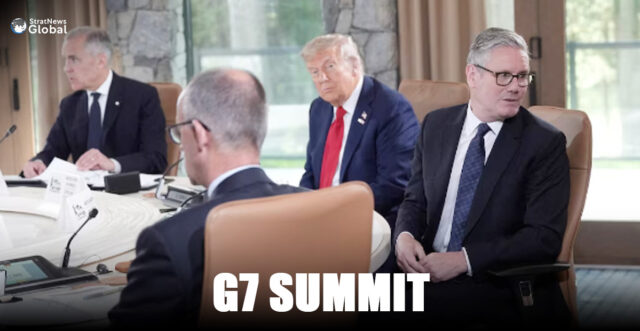Group of Seven (G7) leaders convened on Monday to forge a unified stance on the wars in Ukraine and the Middle East, but efforts were quickly complicated by United States President Donald Trump‘s assertion that removing Russia from the former Group of Eight more than a decade ago had been a mistake.
The once tight-knit grouping has struggled to find unity as Washington retreats from multilateralism and Trump overtly expresses support for Russian President Vladimir Putin.
G7 leaders from Britain, Canada, France, Germany, Italy, Japan, and the U.S., along with the European Union, are convening in the resort area of Kananaskis in the Canadian Rockies until Tuesday.
Group Of Eight
Speaking alongside Canadian Prime Minister Mark Carney, Trump said the former Group of Eight had been wrong to kick out Russia in 2014 after it annexed Crimea.
“This was a big mistake,” Trump said, adding he believed Russia would not have invaded Ukraine in 2022 had Putin not been ejected.
“Putin speaks to me. He doesn’t speak to anybody else … he’s not a happy person about it. I can tell you that he basically doesn’t even speak to the people that threw him out, and I agree with him,” Trump said.
Though Trump stopped short of saying Russia should be reinstated in the group, his comments raise doubts about how much Ukrainian President Volodymyr Zelenskyy can achieve when he meets the leaders on Tuesday. European nations say they want to persuade Trump to back tougher sanctions on Moscow.
Zelenskyy said he planned to discuss new weapons purchases for Ukraine with Trump.
Trump spoke on Saturday with Putin and suggested the Russian leader could play a mediation role between Israel and Iran.
French President Emmanuel Macron dismissed the idea, arguing that Moscow could not be a negotiator because it had started an illegal war against Ukraine.
A European diplomat said Trump’s suggestion showed that Russia was very much on the U.S. mind.
Zelenskyy-Rutte Meeting
European officials said they hoped to use Tuesday’s meeting with Zelenskyy and NATO Secretary General Mark Rutte and next week’s NATO summit to convince Trump to toughen his stance.
“The G7 should have the objective for us to converge again, for Ukraine to get a ceasefire to lead to a robust and lasting peace, and in my view it’s a question of seeing whether President Trump is ready to put forward much tougher sanctions on Russia,” Macron said.
In another early sign, the group of democracies may struggle to reach agreement on key issues, a U.S. official said. Trump would not sign a draft statement calling for de-escalation of the Israel-Iran conflict.
A Canadian official, though, said the conflict would come up in bilateral meetings throughout the day, and it was too early to speculate on the outcome of those conversations. A senior European diplomat echoed those comments, saying Trump had yet to make a decision.
Draft Documents
Canada has abandoned any effort to adopt a comprehensive communique to avert a repeat of the 2018 summit in Quebec, when Trump instructed the U.S. delegation to withdraw its approval of the final communique after leaving.
(With inputs from Reuters)





